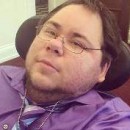- A
- A
- A

For the past year or longer, Leah Smith has been working on the #LiveOn Project. When I was hired around 10 months ago, I was excited to take on this project, and help her make sure it came to fruition. It was not very long after I started working on this project that I became involved in helping lead the global initiative against the film, Me Before You. The message that not even love, family, relationships, and living life are worth more than the desire to kill ourselves simply because we are disabled is prevalent! Representation matters, and this is not the first nor will it be the last, film to depict this very harmful message. There has not been very much of a counter message to this, and we know that the counter message is more realistic to disable lived experiences.
The #LiveOn Movement is that counter message. Disabled people are tired of being told our lives are not worth living. We are fatigued by media depicting all of us as wanting to die or kill ourselves! We are exhausted by the message being that our lives are not productive, worthwhile, or even desirable. We know that with the right supports, the greater access to the things that help to make us independent, we can and do live full and rewarding lives, so why does the media rarely show this!?
The #LiveOn Project was started as a way for disabled people to put the message in our own hands or words. Not having a counter message to the idea that life is better if you are dead as opposed to living life as a disabled person can make aspects of disability life very difficult. For those with acquired disabilities, there is very little positive representation of disability, which is why so many people see becoming disabled as experiencing some kind of loss. People are afraid of disability, and they are afraid to become disabled, but we know the reality is most people will become disabled or be impacted by disability in some kind of way, at some point in their lives. This also manifests in how disabled people are treated. Many times, we are often treated as though we are less, or we have lost something. Not seeing positive disabled experiences represented in the media is a large reason why nondisabled people view disability this way.
For many of us, disability provides us with finding another way to do things, but society likes us to do things as a monolith. Perhaps if disability was more visible, people would not feel this way about being disabled. Perhaps they would not see disability as nothing more than losing the ability to do things the “right way,” and instead saw it as doing things in another way that is neither bad nor wrong. Rather, it is the right way to do things for that person. Through the #LiveOn Project, disabled people can submit videos through our website at www.liveon.net. They can share their experiences with internalized ableism, oppression, feeling alone, and not having access to resources or even other disabled people in their lives so they do not feel quite so isolated.
It is not just people with acquired disabilities who experience this. Those with progressive disabilities, young disabled people trying to come into their own, and those dealing with bullying, depression, and/or suicidal ideation can all experience feeling isolated, alone, and without hope. Our desire to flip the script on this is what is driving this project. Disabled people, especially disabled young people, need to see that they are not alone. They need to know that being disabled is normal and there is nothing wrong with them. They need to see that they can have a future, and that life does not end with having a disability.
Your video should be no more than three minutes. Share something you wish you had known as a young disabled person or as a newly disabled person. Share how you felt about how someone has treated you, how you have viewed yourself, the isolation you felt without having other disabled people in your life or knowing of their existence, or what your thoughts were upon becoming disabled/your disability progressing. This is your story, although chances are many other disabled people will find it very relatable. It is time for the next generation of disabled people to see they are not alone! There is a large and diverse disability community out there, and you do not have to be isolated or without love and support.
Beyond videos, the #LiveOn website offers resources for those who may be struggling. Local independent living centers are often great resources that can help connect you with other disabled people, and help you navigate this difficult non-accessible world! We do not lead the easiest of lives, because the world is not yet accessible to us in the ways it needs to be. This journey around the sun can be lonely, scary, and difficult if we have to navigate these barriers alone. The #LiveOn Movement hopes to empower every disabled person, and assure them that they are not truly alone, after all.